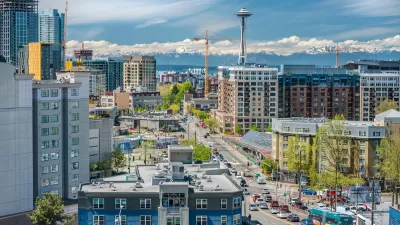Roger Valdez gives his take on the new obstructionism that is dominating public participation and holding up much-needed growth in Seattle and elsewhere.
At the heart of efforts to guide future growth in the city, Valdez sees an irreconcilable, four-man tug-of-war between "labor, neighborhoods, developers, and environmentalists." Faced with proposals that might alter the character of their single-family communities even modestly, neighborhood groups in Seattle staunchly oppose planning that would reduce housing costs, improve transit, make neighborhoods more walkable, and lift redundant legal barriers to development.
It's a dramatic change from the way neighborhood activists used to do business, Valdez argues. "Seattle's neighborhoods are ascendant and they are abusing their power, shifting from fighting for things to fighting against them."
Valdez laments, "What happened? How did earnest, liberal, Birkenstock-wearing activists pushing for parks, play equipment, sidewalks, and kiosks turn into affluent, highly motivated saboteurs of new development, change, and density? Three things happened in the last two decades that shifted neighborhoods from the 'what we want' caucus to the 'what we won't' lobby:"
- The Housing Market – In the absence of developable land, homeowners stand to gain by making their communities more exclusive and scarce.
- Organizing – In the 90s, the Department of Neighborhoods learned to mobilize disadvantaged communities by focusing the discussion on emotionally-charged phrases and images. Now, affluent neighborhoods rally around concerns over "gentrification" to quite the contrary effect.
- A Compliant City Council – Politicians are too eager to satisfy the demands of "a large, affluent, and motivated group of neighborhood activists," even at the expense of healthy community growth.
"This balance of power can't shift without courage, by developers, unions, and environmentalists who must support a louder, stronger voice for dense, transit-oriented neighborhoods, not just intellectual dialogues and power point presentations."
FULL STORY: Seattle neighborhoods fight needed land use reform, density

Planetizen Federal Action Tracker
A weekly monitor of how Trump’s orders and actions are impacting planners and planning in America.

Restaurant Patios Were a Pandemic Win — Why Were They so Hard to Keep?
Social distancing requirements and changes in travel patterns prompted cities to pilot new uses for street and sidewalk space. Then it got complicated.

Map: Where Senate Republicans Want to Sell Your Public Lands
For public land advocates, the Senate Republicans’ proposal to sell millions of acres of public land in the West is “the biggest fight of their careers.”

Maui's Vacation Rental Debate Turns Ugly
Verbal attacks, misinformation campaigns and fistfights plague a high-stakes debate to convert thousands of vacation rentals into long-term housing.

San Francisco Suspends Traffic Calming Amidst Record Deaths
Citing “a challenging fiscal landscape,” the city will cease the program on the heels of 42 traffic deaths, including 24 pedestrians.

California Homeless Arrests, Citations Spike After Ruling
An investigation reveals that anti-homeless actions increased up to 500% after Grants Pass v. Johnson — even in cities claiming no policy change.
Urban Design for Planners 1: Software Tools
This six-course series explores essential urban design concepts using open source software and equips planners with the tools they need to participate fully in the urban design process.
Planning for Universal Design
Learn the tools for implementing Universal Design in planning regulations.
Heyer Gruel & Associates PA
JM Goldson LLC
Custer County Colorado
City of Camden Redevelopment Agency
City of Astoria
Transportation Research & Education Center (TREC) at Portland State University
Camden Redevelopment Agency
City of Claremont
Municipality of Princeton (NJ)





























